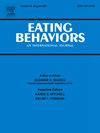A formative study of grandparent caregivers' grandchild feeding responsibilities and practices
IF 2.4
3区 医学
Q2 PSYCHIATRY
引用次数: 0
Abstract
Background
In the US, grandparents are increasingly living with their grandchildren in multigenerational households and/or providing their grandchildren with regular childcare. However, our understanding of the potential for these grandparents to influence children's nutrition and weight status is limited. This formative study aimed to 1) describe the scope of caregiving grandparents' grandchild-focused food responsibilities and practices, including agreement and discordance with parents' food parenting practices, and 2) assess the internal reliability and acceptability of an adapted CFPQ to measure grandparents' food parenting practices.
Methods
Thirty-two grandparents residing with and/or providing regular childcare for their 3 to 5-year-old grandchild enrolled. Data from interviews and closed-ended survey questions were analyzed to identify prevalent food-related responsibilities and practices. Grandparents also completed an adapted version of the CFPQ and provided feedback on applicability and face validity.
Results
Over 80 % of grandparents were at least “sometimes” responsible for planning, preparing, and serving meals and snacks to their grandchild. Cooking, baking, and eating together were common. While many grandparents reported agreeing with their grandchild's parents' food parenting practices, others felt parents were either too lax or too strict. Only 5 of 12 subscales of the CFPQ demonstrated strong internal reliability when used with grandparents; some grandparents reported difficulty completing the CFPQ as they were not with the grandchildren for all eating occasions, and their feeding practices varied over time.
Conclusion
Many caregiving grandparents have significant responsibility for their grandchildren's nutrition environments. Identifying how grandparents' food responsibilities and practices influence children's nutrition and weight status, independently and in conjunction with parents' practices, is a high priority. Grandparent-specific measures of food parenting are needed to advance this research.
祖父母照顾者喂养孙子的责任和做法的形成性研究
在美国,越来越多的祖父母和孙辈一起生活在多代同堂的家庭中,或者定期为孙辈提供照顾。然而,我们对这些祖父母影响儿童营养和体重状况的潜力的了解是有限的。本形成性研究旨在1)描述照顾祖父母以孙子为中心的食物责任和实践的范围,包括与父母的食物育儿实践的一致和不一致,以及2)评估适应性CFPQ衡量祖父母食物育儿实践的内部可靠性和可接受性。方法对32位与3 ~ 5岁的孙辈同住和(或)定期照看孙辈的祖父母进行调查。来自访谈和封闭式调查问题的数据进行了分析,以确定普遍的食品相关责任和做法。祖父母还完成了一份改编版的CFPQ,并提供了适用性和面部效度的反馈。结果超过80%的祖父母至少“有时”负责计划、准备和为他们的孙子提供饭菜和零食。一起做饭、烘焙和吃饭是很常见的。虽然许多祖父母表示同意孙辈父母的饮食教育方式,但也有人认为父母要么太宽松,要么太严格。当与祖父母一起使用时,CFPQ的12个分量表中只有5个显示出很强的内部信度;一些祖父母报告说,他们很难完成CFPQ,因为他们不是在所有的吃饭场合都和孙子孙女在一起,而且他们的喂养方法随着时间的推移而变化。结论许多照料祖父母对孙辈的营养环境负有重大责任。确定祖父母的饮食责任和做法如何独立地并结合父母的做法影响儿童的营养和体重状况,是一项高度优先事项。需要针对祖父母的食物养育措施来推进这项研究。
本文章由计算机程序翻译,如有差异,请以英文原文为准。
求助全文
约1分钟内获得全文
求助全文
来源期刊

Eating behaviors
Multiple-
CiteScore
4.20
自引率
3.60%
发文量
65
审稿时长
60 days
期刊介绍:
Eating Behaviors is an international peer-reviewed scientific journal publishing human research on the etiology, prevention, and treatment of obesity, binge eating, and eating disorders in adults and children. Studies related to the promotion of healthy eating patterns to treat or prevent medical conditions (e.g., hypertension, diabetes mellitus, cancer) are also acceptable. Two types of manuscripts are encouraged: (1) Descriptive studies establishing functional relationships between eating behaviors and social, cognitive, environmental, attitudinal, emotional or biochemical factors; (2) Clinical outcome research evaluating the efficacy of prevention or treatment protocols.
 求助内容:
求助内容: 应助结果提醒方式:
应助结果提醒方式:


